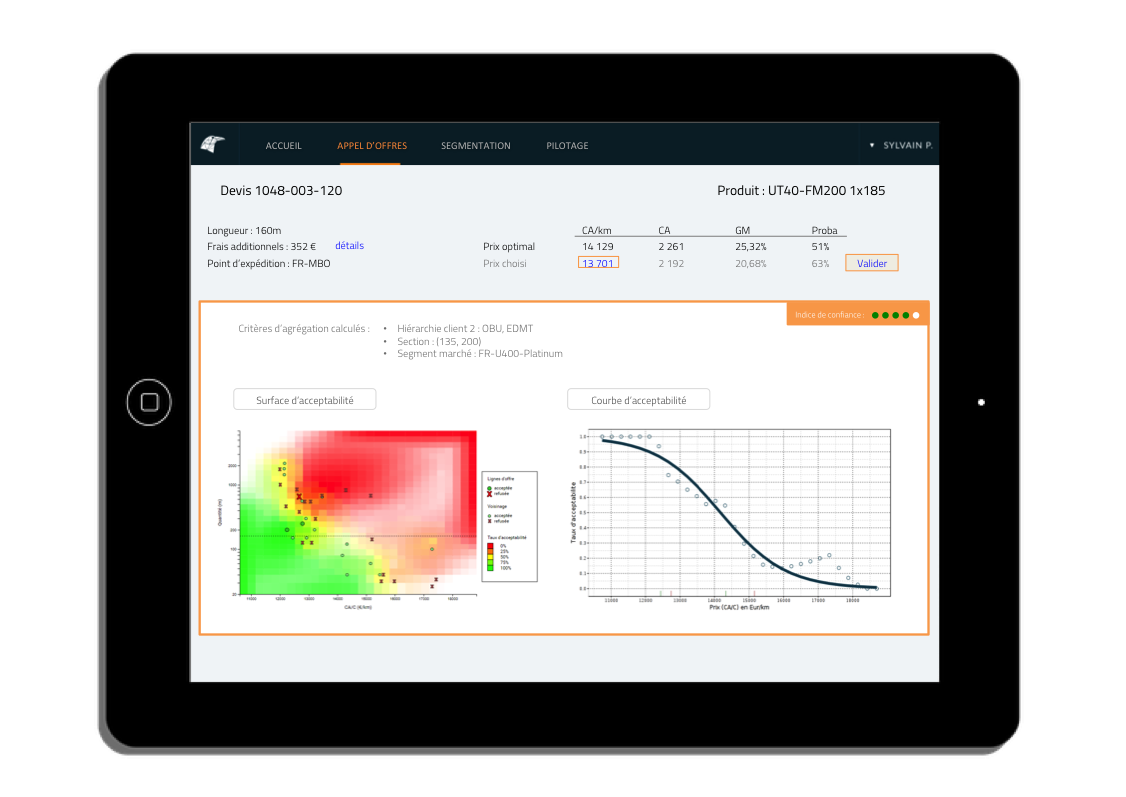Brennus Analytics: finding the right price
Brennus Analytics offers software solutions, making artificial intelligence available to businesses. Algorithms allow them to determine the optimal sales price, helping bring businesses closer to their objective of gaining market share and margin whilst also satisfying their customers. Currently incubated at ParisTech Entrepreneurs, Brennus Analytics also allows businesses to make well-informed decisions about their number one profitability lever: pricing.
Setting the price of a product can be a real headache for businesses. It is however a crucial stage which can determine the success or failure of an entire commercial strategy. If the price is too high, customers won’t buy the product. Too low, and the obtained margin is too weak to guarantee sufficient revenues. In order to help businesses find the right price, the start-up Brennus Analytics, incubated at ParisTech Entrepreneurs, proposes a software making artificial intelligence technology accessible for businesses. Founded in October 2015, the start-up is based on its founders’ own experiences in the field, in their roles as former researchers at the Insitut de Recherche en Informatique in Toulouse (IRIT).
The start-up is simplifying a task which can prove arduous and time-consuming for businesses. Hundreds, or indeed, thousands of factors have to be considered when setting prices. What is the customer willing to pay for the product? At what point in the year is there the greatest demand? Would a price drop have to be compensated for by an increase in volume? These are just a few simple examples showing the complexity of the problem to be resolved, not forgetting that each business will also have its own individual set of rules and restrictions concerning prices. “A price should be set depending on the product or service, the customer, and the context in which the transaction or contractual negotiation will take place”, emphasizes Emilie Gariel, the Marketing Director at Brennus Analytics.

In order to achieve this, the team at Brennus Analytics relies on their solid knowledge regarding the task of pricing, combining it with data science and artificial intelligence technology. The technology they choose to implement depends on the problem they are trying to solve. For statistics, machine learning, deep learning and similar technologies are used. For more complex cases, Brennus employs an exclusive technology, called an “Adaptive Multi-Agent System” (AMAS). This works by representing each factor which needs to be considered by an agent. The optimal price is then obtained through an exchange of information between these agents, taking into consideration the objectives set by the business. “Our solution doesn’t try to replace human input, it simply provides valuable assistance in decision-making. This is also why we favor transparent artificial intelligence systems; it is crucial that the client understands the suggested price”, affirms Emilie Gariel.
The data used to run these algorithms comes from the businesses themselves. The majority have a transaction history and a large quantity of sales data available. These databases can potentially be supplemented by open-source data. However, the marketing director at Brennus Analytics warns: “We are not a data provider. However, there are several start-ups that are developing in the field of data mixing who can assist our clients if they are looking, for example, to raise the price of competition products.” She is careful to add: “Always wanting more data doesn’t really make much sense. It’s better to find a middle-ground between gathering internal data which is sometimes limited, and joining the race to accumulate information.”
In order to illustrate Brennus’ proposed solution, Emilie Gariel gives the example of a key player in the distribution of office supplies. “This client was facing to intense pressure from its competition, and they felt they had not always positioned themselves well in terms of pricing”, she explains. Its prices were set on the basis of a margin objective by product category. This outlook was too generic, disconnected from the client, which led to prices which were too high for popular products in this competitive market, and then prices which were too low for products where client price sensitivity was less strong. “The software allowed an optimization of prices which had a strong impact on the margin, by integrating a dynamic segmentation of products and a flexibility in pricing”, she concludes.
The capacity to clarify and subsequently resolve complex problems is likely Brennus’ greatest strength. “Without an intelligent tool like ours, businesses are forced to simplify the problem excessively. They consider fewer factors, simply basing prices on segments and other limited contexts. Their pricing is often therefore sub-optimal. Artificial intelligence, on the other hand, is able to work with thousands of parameters at the same time”, explains Emilie Gariel. The solution offers businesses several possibilities of how to increase their profitability by working on the different components of pricing (costs, reductions, promotions, etc.). In this way, she perfectly illustrates the potential of artificial intelligence to improve decision processes and profitability in businesses.




Leave a Reply
Want to join the discussion?Feel free to contribute!